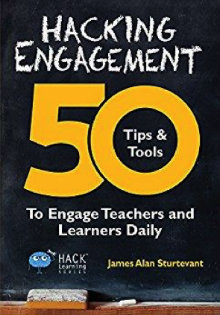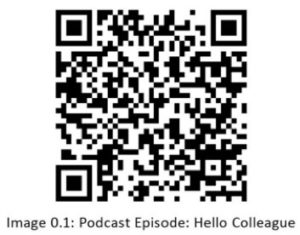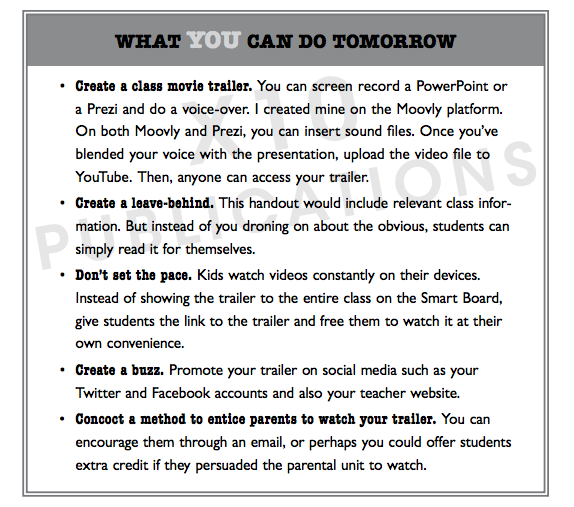Hacking Engagement: 50 Useful Tips and Tools
Hacking Engagement: 50 Tips and Tools to Engage Teachers and Learners Daily
By James Alan Sturtevant
(Times 10 Publications, 2016 – Learn more)
 Reviewed by Linda Biondi
Reviewed by Linda Biondi
As I was searching for a definition that would explain the premise of this book, most of those I found defined “hacking” as an illegal activity or a skillful use of computers. One spoke to ineptitude: a tennis hacker.
I finally tried Dictionary.com, where hacking included “a means to make use of a tip, trick or efficient method of doing or managing something; to hack a classic recipe; to hack your weekend with healthy habits.”
 This sounded good to me. I definitely don’t want to commit a crime or appear inept. A little more snooping around on the Internet and I found some very practical hacking ideas:
This sounded good to me. I definitely don’t want to commit a crime or appear inept. A little more snooping around on the Internet and I found some very practical hacking ideas:
♦ Prevent brain freeze by pressing your tongue flat against the roof of your mouth, covering as much as you can.
♦ Place a dryer sheet in your suitcase to keep your clothes smelling fresh and to reduce static.
♦ Infinity scarves give you infinite options. Use one as a blanket when you’re cold, or fold it over your face to block out the light for a nap.
♦ Wear your heaviest shoes on the plane (like those cute ankle boots you just bought) as well as your heaviest coat. You’ll save room and that coat doubles as a good pillow, too.
Great ideas! You might have even thought, “I know that.” Or “Sounds like advice my mother gave me.” Which brings us to the book at hand.
So what is hacking?
Hacking is taking something good and practical and remaking it for your own use. Hacking education is identifying good ideas shared by people who have experienced the problems or concerns you have and using what works for your own classroom.
In Hacking Engagement: 50 Tips and Tools to Engage Teachers and Learners Daily, the goal is to empower your students through being a colleague and sharing. I love how the author, James Alan Sturtevant, introduces himself. “I’m a teacher, and I am in the trenches with you.” Learn a little about Sturtevant by listening to his book trailer.
Sturtevant is definitely aware of the pressures that teachers face each day because he is facing them as well. He is a middle school social studies teacher who loves his job but who is also honest and admits there are times that he needs something easy, quick, practical, low cost or free to engage his students.
He is also aware of the lack of time that teachers have, trying to juggle writing lesson plans, testing, marking tests, maintaining our students’ attention, and trying to BREATHE.
He takes into consideration the many problems teachers may face and the concerns that may cross our minds. Each of his hacks or tips is a quick read. You can read and reflect on a hack while waiting for the staff meeting to begin, waiting to get your oil changed, or waiting for your own child’s baseball practice to finish.
 While writing the book, Sturtevant realized the importance of using podcasts to supplement the text so be prepared to approach the book with your phone or iPad in hand to connect with the QR codes. Each podcast gives you a quick tutorial that explains the hack.
While writing the book, Sturtevant realized the importance of using podcasts to supplement the text so be prepared to approach the book with your phone or iPad in hand to connect with the QR codes. Each podcast gives you a quick tutorial that explains the hack.
He is also aware that many teachers lack funds. That’s why so many of the hacks can be done without spending a dime (or going through administrative red tape). In fact, his podcasts were produced directly in his classroom using a free online app and classroom equipment. He understands what it is all about.
What you will find
All the books in the Hack Learning Series follow a similar format: an introduction of the problem, a discussion of “the hack,” often step by step, and a chart of what you can do immediately, even the next day.
For example, we always need new ways to generate curiosity and enthusiasm in our classrooms. Imagine it’s the end of February. The weather outside is miserable. You don’t see any days off looming on the calendar.
Your classroom might be starting to look as dreary inside as it is outside. You are a fantastic teacher, but it is just difficult to get students’ attention. A simple, low cost/no cost way to do this is to use the hack “Create a Movie Trailer for Your Class.”

Another example: consider how students think about rules and more rules. They’ve been there, done that. They have written class constitutions, written the rules in their journals, signed class contracts. In contrast, Sturtevant entertains us and the students with a “Class procedures night at the Improv…guaranteed to bring out the ‘ham’ or actor/actress” in your students.
Have them create scenarios or skits portraying the rules from their (humorous) perspective. Let them laugh or giggle, but most importantly let them be part of the process. (Be prepared to swallow your pride if they portray you differently than you see yourself, but remember that it’s based on the fact that they trust you!) If you’re not sure about how this might look, check out the podcast!
As I read the book, I nodded my head and thought, “I did that before!” or “I did that in the past, but why did I forget to use it in the classroom now?” or “I wish I thought about that yesterday.” Sturtevant acknowledges that he is not the “Hacker Guru” – that all teachers are talented and creative.
Who is this book for?
Hacking Engagement is for any educator who wants to be able to eliminate wasted time, resolve management issues, reduce interruptions in the classroom, improve lesson planning, flip negativity and improve technology use.
It doesn’t matter what grade or subject you teach. I teach 4th graders and I have used several of the ideas already. I bought a copy of the book for a colleague who teaches 7th grade social studies, and he adores the ideas. (He is now having a difficult time keeping track of who just borrowed the book and is thinking of taping some sort of GPS locator system on the back cover.)
I’m confident that many of the 50 hacks will benefit you and your teaching and leave you wanting to begin your own hacking list to share with your colleagues. Sturdevant’s passion for helping teachers become the best they can be doesn’t end with the publishing of this book. Be sure to check out his blog and podcasts at his website where he continues to share his real life experiences and more hacking ideas.
Linda Biondi is a fourth grade teacher at Sharon Elementary School in Robbinsville, NJ and a long-time Morning Meeting practitioner. She’s also the recipient of several educational grants, a Teacher Consultant with the National Writing Project, and a participant on the NJ Department of Education Teacher Advisory Panel.


































